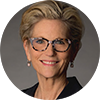Download PDF

If I were ever to get a tattoo, it would be of the Bucking Horse and Rider, a registered trademark of Wyoming and the image on all its license plates. It would go just over my right scapula. I’m from western Wyoming, which evokes the mythos of rugged individualism and self-reliance. While these values are deeply embedded in that culture, I’m reminded of the interdependence among my neighbors. In the deep of winter, when it could be minus 40 degrees Fahrenheit on a school morning, every family tried to start their own cars. Whoever managed to get the car running and warm took all the kids to school. It was a group project (and there was no such thing as a snow day). So, for me, life in the Equality State underlined the importance of community.
Physicians need a similar mix of individualism and interdependence. Becoming an ophthalmologist requires a life of discipline, responsibility, and persistence. These are personal qualities that grow as our competence grows through college, medical school, residency, fellowship, and ophthalmic practice. But these traits don’t magically appear, they are taught and transmitted by our families, teachers, and colleagues.
Most of us can point to a person in our upbringing who expected or modeled discipline and hard work. For me, it was my mother, who believed that a girl could do anything and that the path was education. She provided childcare, tutoring, housing, groceries, and encouragement to several young women so that they could go to college. The values weren’t discussed, they were lived.
In a similar fashion, we teach the deep values of medicine to our medical students and residents as we work intensely together. While we put words to these values through policies and publications, they are primarily taught by example. When I was a college student shadowing a family practice resident, I was deeply impressed by the kindness and compassion she extended to a frightened young single mother who had a sexually transmitted disease. When I was an intern on a cardiovascular surgery unit, the internal medicine chief resident working two floors above would always take the time to help interpret an electrocardiography. When I was a glaucoma fellow, one of my teachers called from a pay phone while he was on vacation to ask whether the anterior chamber was formed on a patient who had a trabeculectomy the week before. These physicians didn’t talk about their commitment to providing great care, they just did it.
Medicine, more than most careers, is taught by apprenticeship. Ophthalmologists who devote themselves to teaching residents exhibit a profound and often unacknowledged generosity. Fellowship training is a remarkable educational experience. We don’t learn the nuances of a subspeciality or of complex procedures by working or studying hard; we are taught by our fellowship mentors who spend a year of their professional lives to teach us.
There is an interdependence among our colleagues, too. I read the American Glaucoma Society forum every day. When a complex case is presented, the community-generated advice is excellent. It’s become more important as the surgical options for treating glaucoma have expanded, and some surgeons have more experience with certain procedures, and we are developing—together—experience and data.
There is perhaps no greater interdependence than a group of physicians in practice together. We work together for decades, and our financial well-being is intertwined. Sometimes we become the best of friends. Furthermore, we shape one another over the years. I have the deepest respect for some of my now-retired senior partners who began their careers at a time when physicians were mostly male and white, and then—as the workforce changed—they worked collaboratively with women and racially diverse surgeons. We grew and changed together. I am a better physician and a better person because of my partners.
My kids predict that I’ll never really get that tattoo, and that’s partly because I don’t need a reminder about who I am and where I came from. We are all becoming, but with the influence, support, and friendship of others who have also dedicated themselves the life of being a healer.